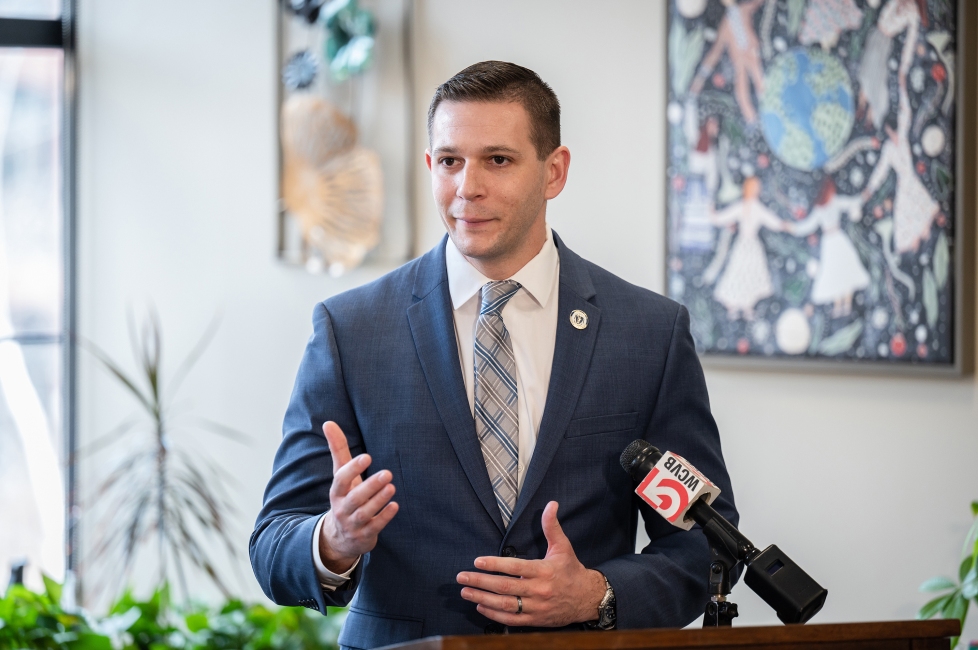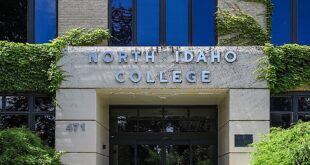
State Rep. Michael Kushmerek speaks during a check presentation by the U.S. Treasury to Making Opportunity Count for over 5.6 million dollars on Tuesday, April 4, 2023. (ALAN ARSENAULT/SENTINEL & ENTERPRISE)
BOSTON — Soaring Costs for Special Education Put Pressure on School Districts
House Democrats on Wednesday initiated a $693 million spending bill that aims to aid school districts facing increased costs for special education. The bill includes a $75 million reserve account that districts can access to manage the rising tuition costs after the expiration of federal grants during the pandemic.
Districts are currently experiencing a 14% increase in the tuition they pay to private special education providers. These providers offer more individualized education for students who can benefit from it. In addition to tuition, the costs of transporting students to these providers have also increased due to inflation, resulting in additional financial burdens for municipalities. Some providers are located over an hour away from the districts they serve.
The issue of rising special education costs has gained significant attention on Beacon Hill, prompting discussions and proposed solutions. Sen. Jo Comerford has filed a bill to establish a commission to study potential solutions to the problem.
According to the Department of Elementary and Secondary Education, one in every five public school students in Massachusetts requires special education services. Over the past 20 years, there has been a 4.2% increase in the number of students needing these services, as well as an increase in the level of need for each student.
Increasing Budgetary Strains and Proposed Solutions
During a recent roundtable hosted by the Massachusetts Association of School Superintendents (MASS), approximately 40 school districts estimated that an average of 27% of their total operating budget is now allocated to special education. This represents a 10% increase from pre-pandemic costs in 2019.
Mary Bourque, co-executive director of MASS, expressed concern about the difficult budget choices districts are facing. She emphasized the importance of funding special education without creating tension or resentment among communities. Several bills have been proposed to address the rising costs and shift more of the financial burden onto the state.
The Cost Threshold and Proposed Legislations
Under the current reimbursement model, districts are eligible to be reimbursed for the tuition of students attending private special education programs approved by the Department of Elementary and Secondary Education. However, lawmakers and advocates argue that the reimbursement rates are insufficient, even though they were expanded in the 2019 Student Opportunity Act.
A bill introduced by Sen. Jacob Oliveira and Rep. Michael Kushmerek aims to decrease the cost threshold for reimbursement by about $12,000 per student. This would provide districts with an additional $9,000 per student, with an estimated cost of $80 to $100 million to the state. The Massachusetts Association of School Superintendents supports this bill, as well as others that would save money for districts at the state’s expense.
Other proposed bills include increasing the state’s reimbursement rate for districts from 75% to 90% (S 335 / H 525), as well as increasing the state’s reimbursement rate for special education transportation costs from 75% to 90% (S 336 / H 526). MASS estimates that these two bills combined would cost the state an additional $80 million.
Federal Funding Challenges and Long-Term Solutions
Despite a federal law authorizing the U.S. government to cover up to 40% of special education-related costs, federal investments in fiscal year 2024 only accounted for 12.7% of excess costs. Two bills propose commissions to study long-term solutions to the funding challenges. These commissions would focus on areas such as the professional development pipeline into teaching special education, expanding the number of private education facilities, and incentivizing competition among transportation providers to reduce costs.
Impact on Small Communities and Municipalities
The funding challenges faced by smaller and poorer communities have put them in a disadvantageous position when it comes to serving students with special needs. Limited staffing flexibility and competition from better-funded schools have resulted in difficulties in providing specialized programming and hiring specialists. The costs to send students to out-of-district private schools can range from $80,000 to $300,000, further burdening local municipalities.
Efforts are being made to find solutions that will alleviate the financial strain on school districts and ensure quality education for students with special needs.
 Mind Uncharted Explore. Discover. Learn.
Mind Uncharted Explore. Discover. Learn.


